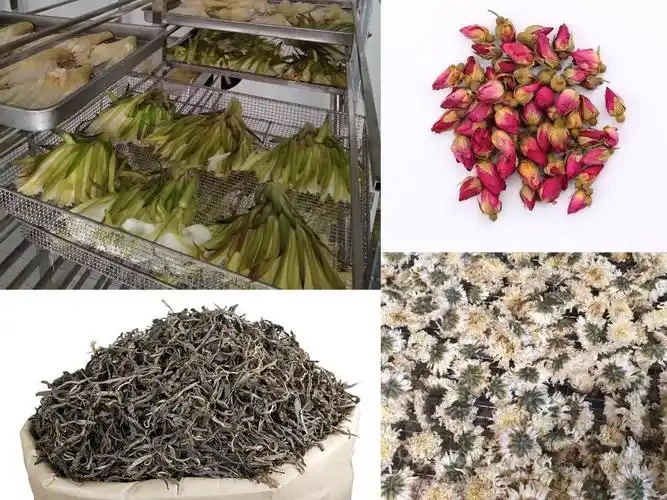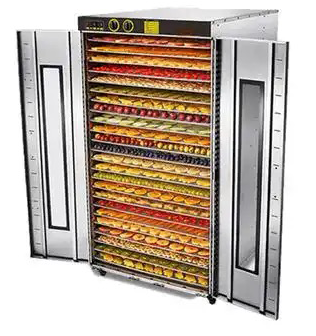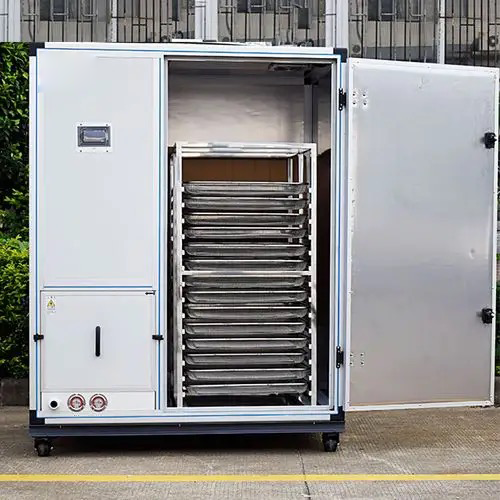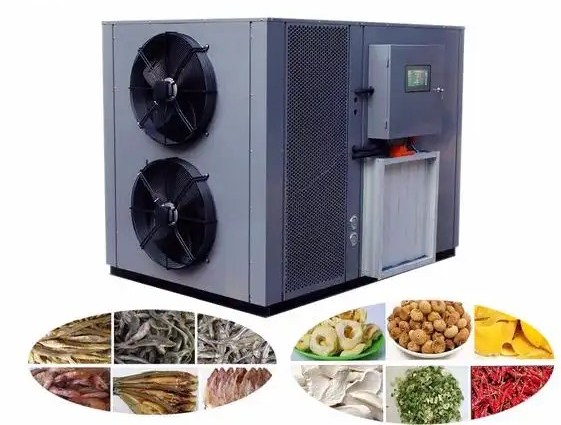
Content Menu
● Understanding Food Drying Technology
● How Heat Pump Dryers Work
● Energy Efficiency
● Lower Carbon Footprint
● Reduced Heat Emissions
● Water Conservation
● Versatility in Food Drying
● Improved Product Quality
● Cost Savings
● Regulatory Compliance
● The Future of Food Drying Technology
● Case Studies: Successful Implementation of Heat Pump Dryers
● Conclusion
● Frequently Asked Questions
>> 1. What is the main advantage of heat pump dryers?
>> 2. How do heat pump dryers work?
>> 3. Are heat pump dryers suitable for all types of food?
>> 3. What are the cost implications of using heat pump dryers?
>> 4. How do heat pump dryers contribute to sustainability?
In recent years, the demand for energy-efficient appliances has surged, particularly in the food processing industry. As a manufacturer of food dryers in China, we recognize the importance of sustainability and energy efficiency in our products. This article explores the environmental benefits of choosing heat pump dryers over traditional electric dryers, particularly in the context of food drying processes.

Understanding Food Drying Technology
Food drying is a crucial process in food preservation, enhancing shelf life, and maintaining nutritional value. Traditional electric dryers have been widely used in the industry, but they often consume significant amounts of energy and can have a larger carbon footprint. In contrast, heat pump dryers utilize advanced technology that offers numerous environmental advantages.
How Heat Pump Dryers Work
Heat pump dryers operate by using a refrigeration cycle to extract moisture from food products. They work by circulating warm air through the food, absorbing moisture, and then condensing that moisture into water, which is removed from the system. This process is more energy-efficient than traditional electric dryers, which generate heat continuously to dry food.
Energy Efficiency
One of the most significant environmental benefits of heat pump dryers is their energy efficiency. Heat pump dryers can reduce energy consumption by up to 50% compared to traditional electric dryers. This reduction in energy use translates to lower greenhouse gas emissions, making heat pump dryers a more sustainable choice for food processing.
Lower Carbon Footprint
By using less energy, heat pump dryers contribute to a lower carbon footprint. For food manufacturers and processors, this is an essential consideration as consumers increasingly demand environmentally friendly products. Choosing heat pump technology not only helps businesses meet these demands but also aligns with global efforts to combat climate change.

Reduced Heat Emissions
Traditional electric dryers often release significant amounts of heat into the environment, which can contribute to local warming and energy inefficiency. Heat pump dryers, on the other hand, recycle heat within the system, minimizing heat emissions. This closed-loop system not only conserves energy but also helps maintain a more stable temperature in the surrounding environment.
Water Conservation
In addition to energy savings, heat pump dryers can also contribute to water conservation. Traditional drying methods may require additional water for steam generation or cooling processes. Heat pump dryers, however, primarily rely on air circulation and moisture extraction, reducing the overall water usage in food drying operations.
Versatility in Food Drying
Heat pump dryers are versatile and can be used for various food products, including fruits, vegetables, herbs, and meats. This adaptability allows food manufacturers to optimize their drying processes while maintaining quality and flavor. The ability to control temperature and humidity levels precisely also ensures that food retains its nutritional value.
Improved Product Quality
The gentle drying process of heat pump dryers helps preserve the quality of food products. Unlike traditional electric dryers that may expose food to high temperatures, heat pump dryers operate at lower temperatures, reducing the risk of nutrient loss and maintaining the food's natural flavors and colors.
Cost Savings
While the initial investment in heat pump dryer technology may be higher than traditional electric dryers, the long-term savings on energy bills can be substantial. Businesses can benefit from reduced operational costs, allowing them to allocate resources more effectively. Additionally, the durability and longevity of heat pump dryers can lead to lower maintenance costs over time.
Regulatory Compliance
As environmental regulations become stricter, food manufacturers must adapt to comply with new standards. Heat pump dryers can help businesses meet these regulations by reducing energy consumption and emissions. This compliance not only avoids potential fines but also enhances a company's reputation as a responsible and sustainable business.
The Future of Food Drying Technology
As the food industry continues to evolve, the demand for sustainable practices will only increase. Heat pump dryers represent a significant step forward in food drying technology, offering a solution that meets both environmental and economic needs. Manufacturers who invest in heat pump technology will not only benefit from lower operational costs but also contribute positively to the environment.
Case Studies: Successful Implementation of Heat Pump Dryers
Several food processing companies have successfully implemented heat pump dryers in their operations, showcasing the technology's benefits. For instance, a fruit processing plant in China switched from traditional electric dryers to heat pump dryers and reported a 40% reduction in energy costs. Additionally, the quality of dried fruits improved, leading to higher customer satisfaction and increased sales.
Another example is a vegetable processing facility that adopted heat pump technology. The facility was able to reduce its water usage by 30% and significantly lower its carbon emissions. These case studies highlight the practical advantages of heat pump dryers in real-world applications.
Conclusion
In conclusion, the environmental benefits of choosing heat pump dryers over traditional electric dryers are significant. From energy efficiency and reduced carbon footprints to improved product quality and cost savings, heat pump technology offers a sustainable solution for food drying processes. As a leading manufacturer of food dryers in China, we are committed to providing our clients with innovative and environmentally friendly solutions that meet the demands of the modern food industry.

Frequently Asked Questions
1. What is the main advantage of heat pump dryers?
The main advantage of heat pump dryers is their energy efficiency, which can reduce energy consumption by up to 50% compared to traditional electric dryers.
2. How do heat pump dryers work?
Heat pump dryers use a refrigeration cycle to extract moisture from food products, recycling heat within the system to minimize energy use.
3. Are heat pump dryers suitable for all types of food?
Yes, heat pump dryers are versatile and can be used for various food products, including fruits, vegetables, herbs, and meats.
3. What are the cost implications of using heat pump dryers?
While the initial investment may be higher, heat pump dryers can lead to significant long-term savings on energy bills and lower maintenance costs.
4. How do heat pump dryers contribute to sustainability?
Heat pump dryers reduce energy consumption and carbon emissions, helping businesses meet environmental regulations and consumer demands for sustainable practices.












